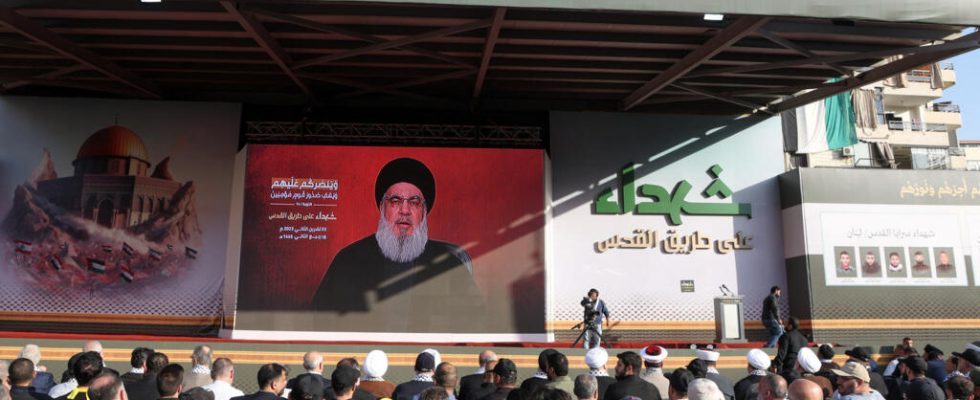This Friday, in his first speech since the start of the war between Israel and Hamas, the leader of pro-Iranian Hezbollah, Hassan Nasrallah, estimated that the conflict could become regional if it did not stop, bringing to United States takes full responsibility for the situation.
3 mins
The head of Hezbollah Lebanese pro-Iranian, Hassan Nasrallah, warned the United States that if Israel did not end his assault against Gaza, the fighting on the Lebanese front could degenerate into a “ vast war “. In a televised speech, he assured that Hezbollah was ready “ for all eventualities “. However, he did not launch a direct appeal to a involvement of the Shiite armed movement in the conflict. Interview with Khattar Abou Diab, Franco-Lebanese political scientist and geopolitical consultant
RFI: How would you characterize the Hezbollah leader’s speech?
Khattar Abou Diab: It is a wait-and-see speech, which prolongs, in a way, the suspense. He talked about all options remaining open, but he didn’t add anything new. It’s a wait-and-see approach, mixed with some verbal threats. It is a speech which also serves to justify, to his base, the number of Hezbollah fighters killed during these three weeks of fighting. It is a traditional speech of solidarity. He tried to absolve his regional axis of responsibility for the Hamas attack, while showing solidarity with Hamas. He therefore left the doors open in all directions, but that means that Lebanon is still held hostage in this regional pincer. The people of Hamas, the people close to it, expected a tough speech, or at least some clarifications, but this speech remained ordinary.
How can we explain this restraint?
Given the seriousness of the situation, he knows well that Lebanon and the region can pay a very heavy price for a regional explosion. Another explanation for this restraint perhaps lies in his feeling that the situation of Hamas fighters is not so catastrophic, that this movement could hold its own in Gaza and that the Israeli ground operation has not yielded so much. now feels like a success. There is no Israeli achievement. And for this, he allows himself to maintain the suspense, to maintain the prolongation of this semi-war, limited to South Lebanon.
For the moment, Hezbollah has no interest in expanding the front, but we must be very careful, because Hezbollah is not in control of itself. If at any point the regional ringleader, Iran, believes that the Hamas movement is foundering, that its interests are threatened, or that behind-the-scenes negotiations with the United States are failing, it remains something provisional. As long as the Gaza war continues, the risk will exist.
How do you assess the hypothesis of an escalation?
It cannot be excluded, because it depends a lot on the evolution of events. There can be a kind of snowball effect that sometimes we can’t master climbing. The region still risks conflagration because we are faced with a series of unknowns: the result of the Gaza war, the American commitment and international and Arab efforts.
The leader of Hezbollah violently attacked the United States: on the one hand, he said he did not fear American naval firepower and on the other, he called on Washington to prevent a regional war. How do you analyze these statements?
This means that he still takes into consideration this American presence, that he takes into consideration the American weight and also that he understands the French warnings. He takes all this into consideration, without declaring it in a clear and precise manner. But Mr. Nasrallah is still waiting for Iranian slogans. It could also be a bet on the United States to prevent the war in Gaza from developing or, at some point, a certain compromise where Iran and Hezbollah could gain something from this regional explosion.
